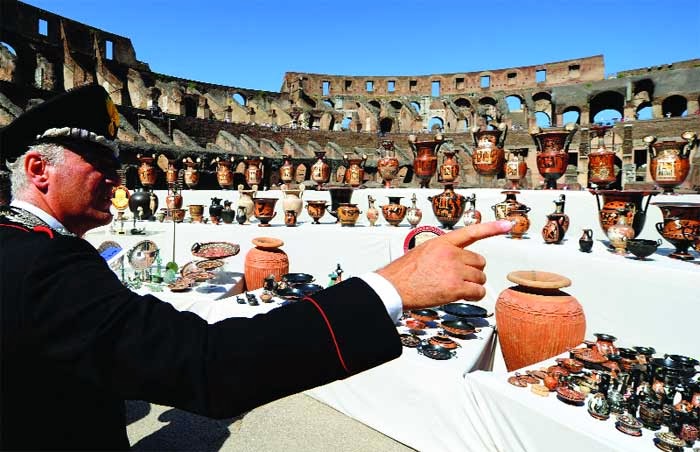
Carabinieri is reaching towards the UK [Credit: The Art Newspaper]
Italy’s state legal counsel was planning to send, this month, a final warning to the liquidator responsible for the assets of the disgraced antiquities dealer Robin Symes, who was declared bankrupt in 2003. Italy’s letter includes a detailed list of around 700 ancient objects, including sculptures and jewellery, that Italy is claiming because it believes they were taken from its territory illegally.
The action is taking place amid rumours that the liquidator, the British firm BDO, is selling the material in the Middle East on behalf of Her Majesty’s Revenue & Customs (HMRC), which is attempting to recoup tax owed by Symes’s firm, Robin Symes Ltd, which is now in liquidation. If BDO fails to respond to Italy’s warning by the end of the month with detailed information on the status of each item on the list, Maurizio Fiorilli, Italy’s state legal counsel on the Symes case, will notify the public prosecutor at the Criminal Tribunal in Rome.
The prosecutor would then evaluate the situation and could choose to sue BDO in the UK under the Dealing in Cultural Offences Act, passed in 2003. This introduced the criminal offence of dealing in cultural objects that are “tainted” if the person or firm doing so knows the status of the artefacts in question. The maximum penalty is seven years in prison and an unlimited fine.
Italy’s move follows rumours circulating in the trade and among archaeologists that BDO is attempting to sell the Symes antiquities in the Middle East, specifically to Abu Dhabi, which is building collections for numerous museums that are scheduled to open in the next few years. Italy was first made aware of these rumours in 2011, when the state legal counsel warned in a letter to a London law firm representing BDO that, should the rumours prove to be true, this would prompt an immediate reaction from Italy and put the country’s ongoing negotiations with the liquidator under severe strain.
BDO declined to comment. In a statement, a representative of HMRC said: “For confidentiality reasons, HMRC does not discuss the affairs of individual businesses. Our aim is… to collect, as efficiently as we can, the debts that are due and to prevent any situation deteriorating further, using the range of powers available to us.”
Angry archaeologists
The case has angered archaeologists. “It’s a scandal for the British government,” says Christos Tsirogiannis, a British-based Greek archaeologist who has assisted the Greek government with its own investigation of the antiquities in the Symes collection. Tsirogiannis says that he requested access to the collection as part of his research for his PhD at the University of Cambridge but that BDO failed to respond to his queries.
“It would be good to have official announcements from all the governments concerned about the Symes case, so that everyone can learn the whole truth about the key questions: why are the objects identified by the Italian state not being sent to Italy? Are the other governments concerned claiming any objects too? If so, how many and which are they?”
Italy has surveyed the Symes collection as part of its ongoing negotiations with BDO. With the assistance of officials from the UK’s Department for Culture, Media and Sport, the two parties reached an agreement in September 2007 to collaborate on the investigation of the material. Italian archaeologists then travelled to London to inspect the artefacts held in storage in London warehouses. Their assessment enabled the Italian authorities to draw up a list of items they believe were looted from Italy.
On Italy’s list
The list includes jewellery, dozens of Greek-style vessels, marble portrait heads, a large terracotta statue of a seated goddess holding a dove and a pomegranate, a bronze bust of Alexander the Great and several bronze statuettes, including one of Zeus and another of Aphrodite.
Italy submitted a full list of the items it was claiming to BDO on 3 August 2012, but has not yet had a response. Although BDO declined to discuss the case, the firm is known to have requested additional information from Italy proving that the claimed objects were removed from the country illegally. Sources close to the Italian investigators say that Italy has provided ample evidence to substantiate its claim and that it is up to the liquidator to prove that the material is not looted.
Greece is also investigating the Symes collection but is not believed to have submitted a formal claim for the return of any items. Meanwhile, the family of the late Christo Michaelides, Symes’s former business partner, is also one of the creditors of Robin Symes Ltd. The Michaelides family’s lawyer, Ludovic de Walden of the London firm Bird & Bird, says that his clients would not object to the return of objects to Italy provided the Italian claim is based on solid evidence.
Authors: Cristina Ruiz and Javier Pes | Source: The Art Newspaper [January 16, 2014]